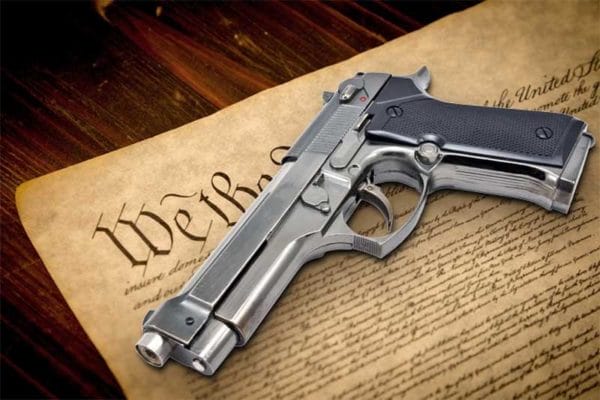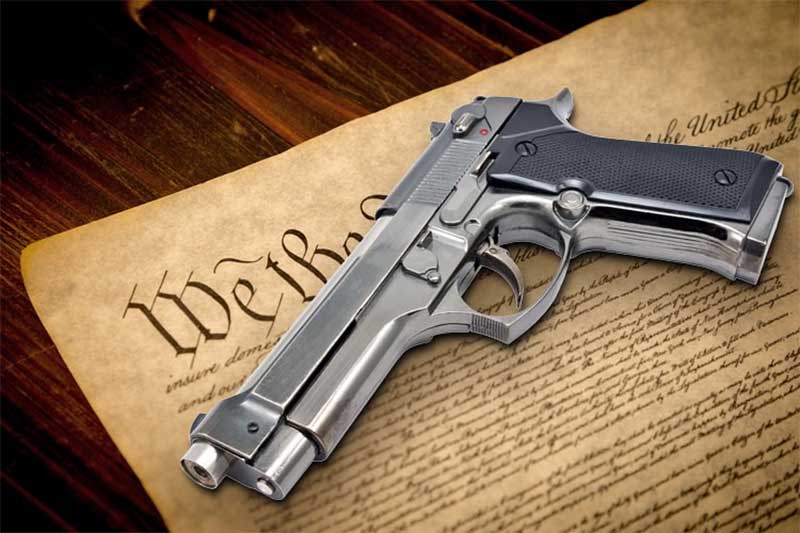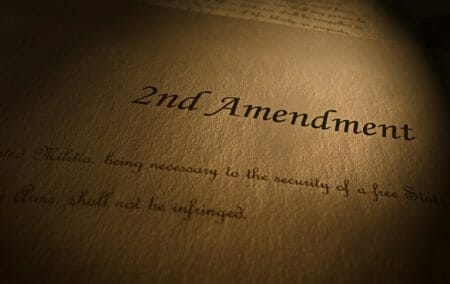Opinion

The debate over gun rights has taken a new turn, as recent legal challenges ask whether the Second Amendment’s protections apply solely to U.S. citizens or extend to all individuals on American soil, including undocumented immigrants. Recent court rulings and arguments from legal scholars have brought this question to the forefront, sparking concerns over government power and constitutional rights.
The phrasing of the Second Amendment, which grants the right to keep and bear arms to “the people,” is at the heart of the legal debate. In the 2022 New York State Rifle & Pistol Association v. Bruen decision, the Supreme Court held that any regulation restricting this right must align with historical practices from the founding era, making laws without precedent presumptively unconstitutional. This test is now being applied to a federal law, 18 U.S.C. § 922(g)(5)(a), which prohibits firearm possession for undocumented immigrants.
Legal challenges are increasingly arguing that the federal government cannot exclude undocumented immigrants from “the people” in the Second Amendment.
Alan Mygatt-Tauber, author of “The Second Amendment Rights of Undocumented Immigrants,” states that the term “the people” in the Second Amendment must include all those physically present in the U.S., regardless of status. He argues, “The Court has consistently focused on territorial presence, rather than status, as the touchstone of constitutional rights” and notes that this reasoning has extended protections to undocumented immigrants under other amendments in the Bill of Rights.
Who Are “The People”?
The issue is whether “the people” in the Second Amendment applies to undocumented immigrants. Under Bruen, courts must examine whether restrictions on firearm possession are consistent with historical norms. This has led some to argue that, historically, immigrants—including those not yet citizens—were allowed to bear arms for defense and thus should still be covered by the Second Amendment today. However, others contend that undocumented status fundamentally excludes individuals from such protections.
Devout supporters of the Second Amendment argue that it is a fundamental right that should not be contingent on citizenship. They see the restriction on undocumented immigrants as setting a troubling precedent that could lead to further erosion of Second Amendment rights for other groups. This concern echoes Mygatt-Tauber’s argument, where he highlights that “historical laws disarming individuals were focused on preventing arms falling into the hands of those deemed dangerous,” not on blanket bans based solely on one’s legal immigration status.
Gun Owners: For or Against?
On one hand the argument can be made that the right to bear arms should be a universal protection under the Constitution, applicable to anyone physically present in the country.
For American gun owners, the potential ripple effects of these cases are significant. If 922(g)(5)(a) passes the Bruen test, many worry it could establish a dangerous precedent, allowing the government to restrict gun rights for groups based on broad, government-defined classifications instead of individualized assessments of dangerousness.
This concern takes on new urgency following the decisive 2024 election of Donald Trump, which sent a clear message: Americans want a return to strong, decisive action on illegal immigration, including mass deportations. With Trump’s historic mandate, a national effort to deport undocumented immigrants is expected to begin in 2025, reinforcing the principle that America’s laws—and rights—are for those who respect its borders and laws. For gun owners, this is a step toward restoring order and safeguarding American communities and resources, which they believe have been strained under weak enforcement.
This connection between law enforcement and Second Amendment rights underscores the conviction that the right to bear arms should be a fundamental protection for U.S. citizens and legal residents—those who are committed to America’s founding principles. Gun rights advocates argue that if the government can broadly disarm undocumented immigrants, it’s essential that this action reflects a wider national commitment to securing American values and heritage. Upholding mass deportation policies, they contend, is a critical part of defending America’s resources, culture, and rights, including the right to bear arms.
So what is the truth, where do we go from here?
Historical Context & Legal Precedents
Historically, the founders did not institute broad prohibitions on firearm ownership for immigrants. Colonial-era laws allowed immigrants who had not yet attained citizenship to bear arms in defense of their communities. The federal prohibition on undocumented immigrants possessing firearms is relatively recent in the scope of American history, and opponents argue that it lacks the historical foundation required by Bruen.
Supporters of the ban, however, argue that it is necessary for public safety, drawing parallels with historical laws that limited firearm access for groups considered to pose threats, such as disloyalists or Native Americans. Yet critics argue these restrictions were based on individual assessments or specific historical circumstances, not broad prohibitions based on legal status alone.
Supreme Court Rulings and Broader Implications
Since the Supreme Court’s decision in District of Columbia v. Heller (2008), affirming the right to bear arms as an individual right, there has been an ongoing debate over whether these rights apply to non-citizens. Lower courts have issued mixed rulings, with some concluding that “the people” includes undocumented immigrants, while others hold that it does not. The Supreme Court has not directly addressed the issue, leaving uncertainty in its wake.
Legal experts believe that if the Supreme Court takes up a case on this issue, it could redefine the scope of the Second Amendment, impacting not just undocumented immigrants but also American gun owners. The potential for a ruling that broadly restricts gun ownership based on status has alarmed many advocates, who argue that any ruling limiting the right to bear arms could have a lasting impact on individual freedoms.
Future Implications
As these legal challenges progress, the stakes for Second Amendment rights in America have rarely been higher. For advocates of universal gun rights, this debate represents a fundamental question about the nature of the Second Amendment: is it an American right or a human right?
The courts’ eventual decisions on whether undocumented immigrants are part of “the people” will ripple across the legal landscape, influencing how rights are applied and interpreted in the future. With these cases, the judiciary has a unique opportunity to reinforce the Second Amendment as a protection rooted in principles of self-defense and liberty, underscoring the right to bear arms as a fundamental liberty that transcends legal status and government boundaries.
What do you think the answer to this is? Let us know in the comments below.






So it’s critical to the survival of the Second Amendment to remember and never forget the truth that it is a fundamental God-given right. Our constitution does not GIVE us this right, it RECOGNIZES it and promises its protection when you are a citizen of the United States of America or at least legally dwell here. All humans have this right, but most governments do not recognize it and protect it. Thus, citizens of most countries are deprived of this right. All people who LEGALLY come to the United States should have this right while in the US, unless they… Read more »
Return to Sender.
I don’t think illegal immigrates should have the right to keep and bear arms, nor should incarcerated persons, once a incarcerated is released from supervision they should get all their rights back but an illegal doesn’t deserve a right to vote, own a firearm, get free healthcare, free housing, prepaid debit cards on Americas dime!
This discussion reminds me of the wasted time theologians frittered away on “how many angels can sit on the head of a pin”. The “people” were vested, land owners, and residents at the time that the Second Amendment was ratified. If illegals can claim citizenship just because they’ve got a toe across the border the US will be in one large world of hurt. Based on the argument that illegals can possess firearms with the same rights as citizens we can expect lethal gangs from Mexico, South America, Russia, China, the middle east, and etc. to set up shop in… Read more »
Undocumented immigrants , new arrivals , regulated arrivals, “alien” to “noncitizen” The fact remains they are here after crossing into the United States of America with out permission that makes them illegals They are not immigrants they are criminals who broke our laws no rewards. The action deportation back to where they came from & stop funding to those countries with taxpayers hard earned income. I can not enter a country crossing any borders with out becoming a criminal being a American would make me a target for full prosecution under that country’s laws. In fact to vacation in Europe these… Read more »
the problem comes down to how immigration was enforced, when the constitution was written it was more common for people to have to have permission to leave we started with receiving and rejecting around 1820